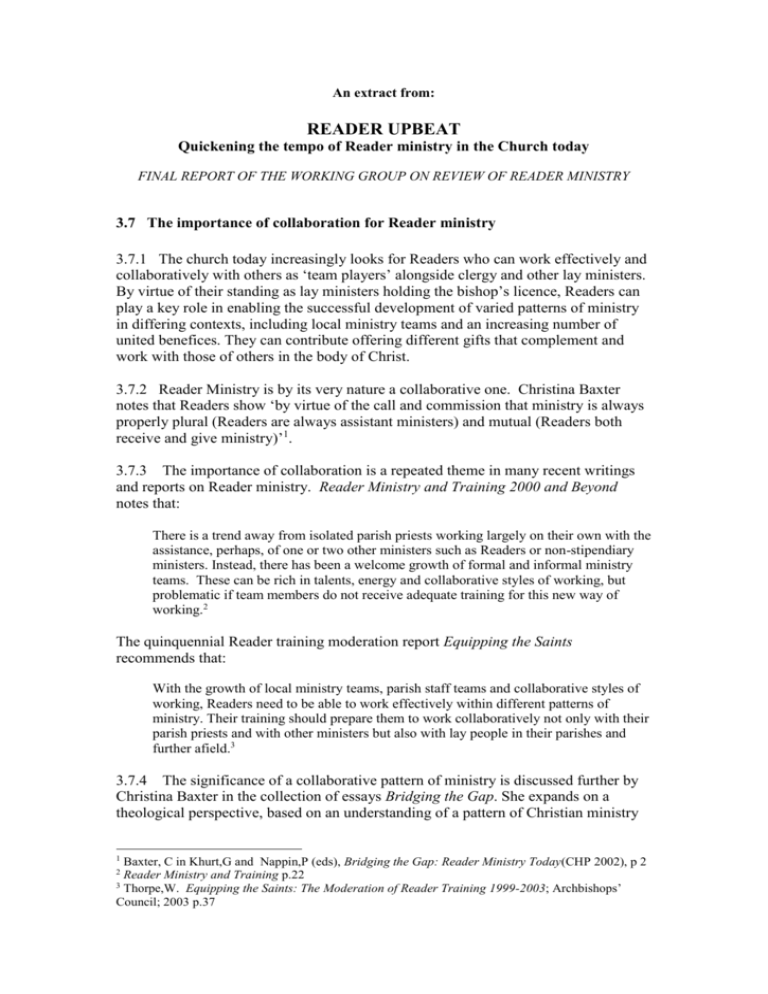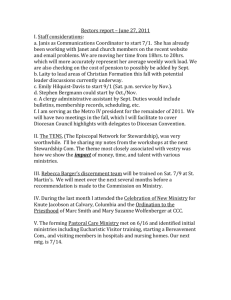The importance of Collaboration: Reader Upbeat
advertisement

An extract from: READER UPBEAT Quickening the tempo of Reader ministry in the Church today FINAL REPORT OF THE WORKING GROUP ON REVIEW OF READER MINISTRY 3.7 The importance of collaboration for Reader ministry 3.7.1 The church today increasingly looks for Readers who can work effectively and collaboratively with others as ‘team players’ alongside clergy and other lay ministers. By virtue of their standing as lay ministers holding the bishop’s licence, Readers can play a key role in enabling the successful development of varied patterns of ministry in differing contexts, including local ministry teams and an increasing number of united benefices. They can contribute offering different gifts that complement and work with those of others in the body of Christ. 3.7.2 Reader Ministry is by its very nature a collaborative one. Christina Baxter notes that Readers show ‘by virtue of the call and commission that ministry is always properly plural (Readers are always assistant ministers) and mutual (Readers both receive and give ministry)’1. 3.7.3 The importance of collaboration is a repeated theme in many recent writings and reports on Reader ministry. Reader Ministry and Training 2000 and Beyond notes that: There is a trend away from isolated parish priests working largely on their own with the assistance, perhaps, of one or two other ministers such as Readers or non-stipendiary ministers. Instead, there has been a welcome growth of formal and informal ministry teams. These can be rich in talents, energy and collaborative styles of working, but problematic if team members do not receive adequate training for this new way of working.2 The quinquennial Reader training moderation report Equipping the Saints recommends that: With the growth of local ministry teams, parish staff teams and collaborative styles of working, Readers need to be able to work effectively within different patterns of ministry. Their training should prepare them to work collaboratively not only with their parish priests and with other ministers but also with lay people in their parishes and further afield.3 3.7.4 The significance of a collaborative pattern of ministry is discussed further by Christina Baxter in the collection of essays Bridging the Gap. She expands on a theological perspective, based on an understanding of a pattern of Christian ministry 1 Baxter, C in Khurt,G and Nappin,P (eds), Bridging the Gap: Reader Ministry Today(CHP 2002), p 2 Reader Ministry and Training p.22 3 Thorpe,W. Equipping the Saints: The Moderation of Reader Training 1999-2003; Archbishops’ Council; 2003 p.37 2 that reflects something of our understanding of God in the doctrine of the Trinity. She writes: We also set our understanding within the framework of a Trinitarian theology which recognises that the unity of God is a call to the church to be united, and the differentiation of Father, Son and Holy Spirit within the Godhead encourages us to see that there can be genuine differences of gifting and tasks which does not destroy unity but enriches and contributes to it.4 3.7.5 Collaboration is dependant on healthy relationships and interactions. Some dioceses have introduced a range of processes and frameworks to encourage and support teams and shared ministry, though collaborative ministry cannot be defined by any single organisational pattern. Characteristics of good collaboration include shared purpose and objectives, consultation and shared decision making, high levels of communication and trust, and some form of accountability and appraisal for those involved in sharing ministry.5 3.7.6 The importance of collaboration within the church is now widely recognized. However, despite embracing the concept of collaboration in principle, in practice the aspirations frequently remain unfulfilled. Patterns that existed in the past can still influence assumptions and expectations of ministerial roles. An inherited tradition of a minister as a superior expert and solo operator dates back to a time when the ‘clerk in holy orders’ may have been the only person in a community with educational qualifications. Some clergy recollect being told during training that numbers of stipendiary clergy and curates would drop, so that ‘in future you will be on your own’. Clergy have not always been prepared for the role of oversight, and some do not recognise the significant difference between delegating work to others, and ministering collaboratively alongside them. Readers also are unlikely to have been trained to work in a collaborative way. In the past, Reader training often focussed on particular tasks and skills, rather than on a potential role in the parish as an enabler. 3.7.7 There are many reasons why good patterns of collaborative ministry are not always embraced and implemented in parishes. Many stipendiary ministers have increasingly large areas of oversight, either in united benefices, across deaneries or with parochial responsibilities augmented by a range of sector portfolios or diocesan roles. Most stipendiary clergy, as general practitioners, find themselves having to be pastors, worship leaders, initiators of mission, community chaplains, school governors and taking on many other roles. Some may not be accustomed to working with volunteers, whose employment patterns may leave them unable to meet during daytime hours. The very range of demands can militate against the parish clergy being able to step back and reflect upon the shape and management of their ministry. 3.7.8 The questionnaire sent to Readers indicated that about half the respondents knew of some diocesan provision to encourage team or collaborative working. Patterns of collaborative working and appropriate skills now need to be intentionally fostered by ministerial training courses and diocesan programmes. The importance of ongoing support for developments relating to collaboration amongst clergy and lay ministers is addressed in section 4.12. 4 5 Bridging the Gap, p.2 For a longer checklist for Good Collaborative Ministry see Stranger in the Wings – ABM 1998 p.51






